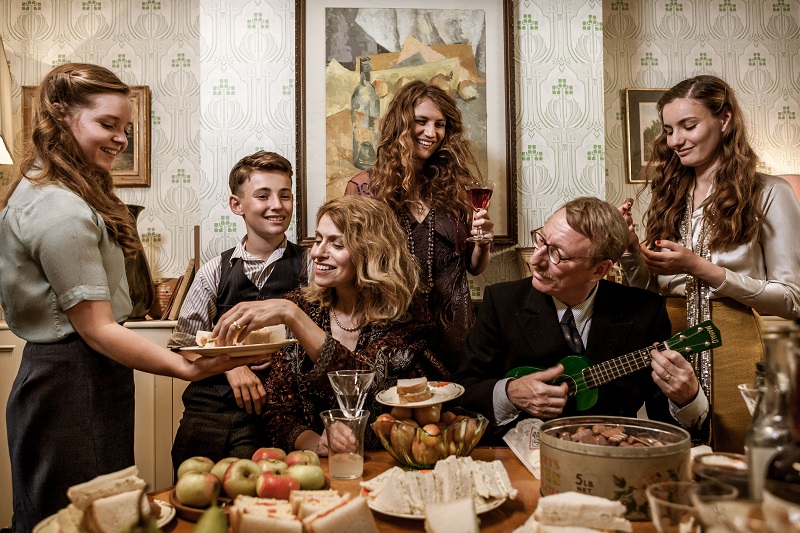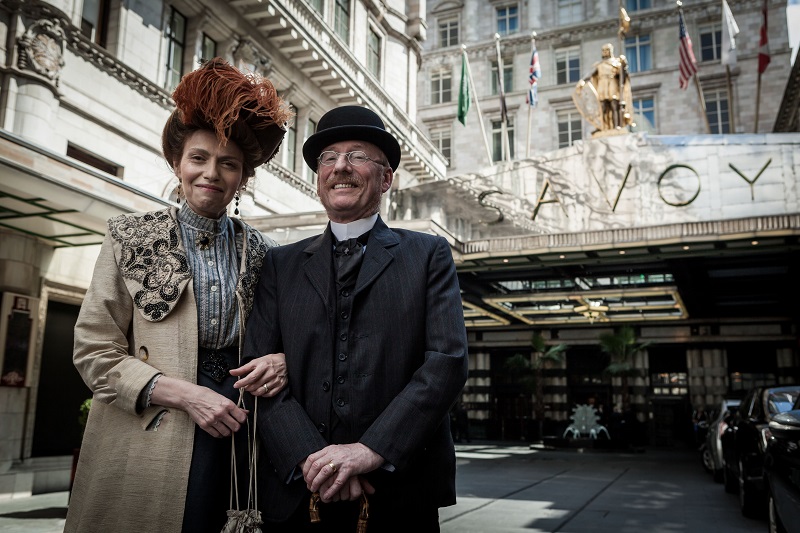Jewish star of Further Back In Time For Dinner: ‘I feel very rooted to British history’
Rochelle Robshaw is back with husband Brandon and their three children to explore life in the early 20th century on BBC2's reality show
The last time Rochelle Robshaw decided to immerse herself in history and live as other families did during the second half of the 20th century, she found herself “stuck in the kitchen for 30 years”.
Indeed, the unlikely Jewish star of BBC2’s Back In Time For Dinner, a constructed reality series presented by food critic Giles Coren, became so overwhelmed by her domestic duties that by the 1970s she was forced to exclaim: “This is what breaks a woman!”
But when the BBC again came knocking for a follow-up series, Rochelle had no hesitation in signing up husband Brandon, 54 and their three children, Fred, 12, Ros, 17 and Miranda, 20 – even if it did mean a return to the dreaded kitchen.
Get The Jewish News Daily Edition by email and never miss our top stories Free Sign Up
Rochelle, 53, who works for Eastside Community Heritage, laughs as she tells me: “Actually we were very flattered we were asked to do it again and we had had a really good time, a really positive experience with the first series.
“I think the idea of going back that much further was a bit of an adventure, because we would go back to things that are out of our living memory.”
Further Back In Time For Dinner sees the family sent back to the early 1900s through to the 1940s, experiencing everything from the opulence of the late Victorian age to the excitement of the Roaring Twenties and the devastation wrought by two world wars.
For six weeks over the summer, the Robshaws upped sticks from their home in Walthamstow (where filming took place for the last series) and moved into a typical Victorian terrace in Tooting, where every room was authentically kitted out for each decade.
This is included a kitchen without the conveniences of modern life, but there was something of a surprise awaiting Rochelle – albeit one wrought with mixed feelings – as they were introduced to 19-year-old Debbie, a part-time chef who took on the role of their housemaid.
In the early episodes, the Robshaws were even given a bell to ring whenever they needed her assistance, but Rochelle was particularly hesitant to use it.
“I used to joke about it, ‘ooh, wouldn’t it be nice to have a maid’, but when you are faced with a living, breathing person and that is their status, I just found it really uncomfortable,” she reveals.
“I had these really unusual feelings towards Debbie, in that I felt quite maternal, because she’s the same age as my daughters.
“You hear these really terrible stories about people mistreating their staff, but I think there must have been lots of feelings that were undisclosed and undescribed, like caring for somebody, wanting them to be well and loving them.
“I do think it must have been a very interesting dynamic that existed between the woman of the house and her staff.”
That said, she was “genuinely relieved” not to have to take on the burden of cooking and admits with a laugh: “The better person was in the kitchen”.
For the first episode alone, sans a fan oven or microwave, blenders or even a fridge, Debbie had to rustle up a feast that involved her hacking the flesh off a calf’s head to make mock turtle soup, getting her hands dirty with raw kidneys and knocking up a ragout of grouse.
That was all aside from the lamb chops she had to make for the following day’s breakfast, or the scrambled egg and scrambled brains concoction to follow.
Come what may, from jellied eels to fish sausages and a vegetarian Suffragist dinner, the Robshaws were pretty game in trying the full gambit of Britain’s ever-changing appetite over the decades.
Happily for Rochelle, she was even able to sit down with the family for a traditional Jewish meal featuring latkes, gefilte fish, salt beef sandwiches, roast chicken and chicken soup with knaidlich while filming for the 1930s episode.
She and Coren, who is also Jewish, travelled to the East End to explore Rochelle’s Jewish ancestry, and discovered her great-great-grandfather had owned a shop in Cable Street.
It was just yards from where the infamous clash took place between Oswald Mosley’s black shirts and anti-fascist demonstrators, including much of the local Jewish community, in October 1936.
Looking at census records, she also discovered her great-great uncle had fought and died in the First World War, aged just 19.
Rochelle tells me: “I didn’t know any of this. To know my family had lived in Cable Street and were witness to life in the East End and the riot, and that their son had fought and died in the war, really rooted me to British culture.”
While the 1930s ended with the dark shadow of fascism over Europe, for Rochelle the start of the decade was one of the most “exciting” periods of the early 20th century – with the caveat of having wealth and position.
To know my family had lived in Cable Street and were witness to life in the East End and the riot really rooted me to British culture.”
“If you are in London in a middle class family and you have money, life was good,” concludes Rochelle. “There was an abundance of food, a new interest in organic produce, new interest in English cuisine and actually it feels like a very modern time and strangely reminiscent of what we have now.
“Of course you would need this bubble of existence, but I think that would be an extremely interesting time to be a woman.
“The clothes are suddenly that much more freeing, the woman’s movement is gathering pace and it does feel like a time when things could have been very different.”
How different, of course, history turned out, as the Robshaws experience in the later episodes. It’s a bittersweet ending that makes Rochelle all the more appreciative of the life she has today.
“Without a doubt, it does make you realise just how much we have,” she concludes. “And I certainly have a renewed appreciation what my family went through.”
Further Back In Time For Dinner continues on BBC Two on Tuesdays, 8pm.

Thank you for helping to make Jewish News the leading source of news and opinion for the UK Jewish community. Today we're asking for your invaluable help to continue putting our community first in everything we do.
For as little as £5 a month you can help sustain the vital work we do in celebrating and standing up for Jewish life in Britain.
Jewish News holds our community together and keeps us connected. Like a synagogue, it’s where people turn to feel part of something bigger. It also proudly shows the rest of Britain the vibrancy and rich culture of modern Jewish life.
You can make a quick and easy one-off or monthly contribution of £5, £10, £20 or any other sum you’re comfortable with.
100% of your donation will help us continue celebrating our community, in all its dynamic diversity...
Engaging
Being a community platform means so much more than producing a newspaper and website. One of our proudest roles is media partnering with our invaluable charities to amplify the outstanding work they do to help us all.
Celebrating
There’s no shortage of oys in the world but Jewish News takes every opportunity to celebrate the joys too, through projects like Night of Heroes, 40 Under 40 and other compelling countdowns that make the community kvell with pride.
Pioneering
In the first collaboration between media outlets from different faiths, Jewish News worked with British Muslim TV and Church Times to produce a list of young activists leading the way on interfaith understanding.
Campaigning
Royal Mail issued a stamp honouring Holocaust hero Sir Nicholas Winton after a Jewish News campaign attracted more than 100,000 backers. Jewish Newsalso produces special editions of the paper highlighting pressing issues including mental health and Holocaust remembrance.
Easy access
In an age when news is readily accessible, Jewish News provides high-quality content free online and offline, removing any financial barriers to connecting people.
Voice of our community to wider society
The Jewish News team regularly appears on TV, radio and on the pages of the national press to comment on stories about the Jewish community. Easy access to the paper on the streets of London also means Jewish News provides an invaluable window into the community for the country at large.
We hope you agree all this is worth preserving.
-
By Brigit Grant
-
By Laurent Vaughan - Senior Associate (Bishop & Sewell Solicitors)
-
By Laurent Vaughan - Senior Associate (Bishop & Sewell Solicitors)
-
By Laurent Vaughan - Senior Associate (Bishop & Sewell Solicitors)
-
By Laurent Vaughan - Senior Associate (Bishop & Sewell Solicitors)























